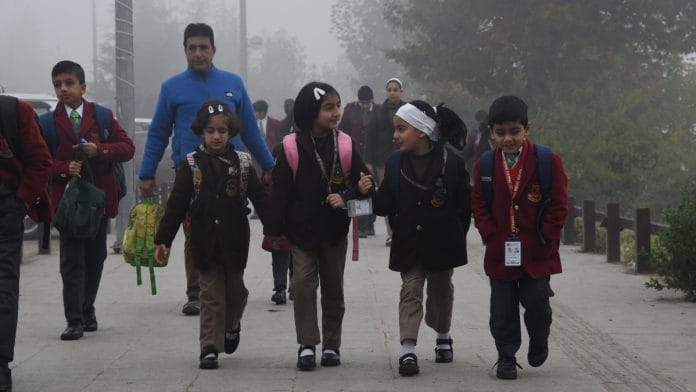Thank you dear subscribers, we are overwhelmed with your response.
Your Turn is a unique section from ThePrint featuring points of view from its subscribers. If you are a subscriber, have a point of view, please send it to us. If not, do subscribe here: https://theprint.in/subscribe/
When I was growing up, Gudiya was my only companion. She was a year or two younger than me. Her grandmother worked in our house as the washerwoman. But when my father bought a washing machine, her job became obsolete. However, there was no way she could become obsolete for our family. So she continued to visit us every day, helping my mother chop vegetables, often sitting and cuddling our spoiled Labrador, and sitting in the verandah keeping an eye on me and Gudiya.
Our games were simple. Sometimes we played hide and seek. I loved to hide, and Gudiya always obliged. Even as I write this, I wonder why I never asked her if she wanted to hide while I played the seeker.
At other times, we played teacher-teacher. Looking back, I wonder why we called the game ‘teacher-teacher’ when, in reality, it was always one person playing the teacher while the other, along with all the soft toys, dolls, and pillows available, sat in a classroom as students. But our most favourite game was the village scene. I would play a farmer ploughing the field, while Gudiya was my mother cooking for me. Now, it all seems so clear and reeks of class divide. Each game and each privilege I snatched from her, and she meekly gave away, was not just a reflection of what we grew up with but was also setting the tone for the future we were being prepared for. While I thought working was a fancy dream and role I wanted as a grown-up, for Gudiya, the choice was simple – cooking and household chores.
Like most such friendships, ours too died a natural death as we grew older. I was sixteen when my father decided to send me to another city for further studies. I left with so much anticipation of the future and exhilaration that somehow Gudiya was left behind, even in my memories. In the first few months, when I called and talked to my parents, Gudiya often became an afterthought. It was only after I had hung up that I would remember I hadn’t asked about her. One day, I asked my mother about her. She paused and hesitated, and then she said, “Gudiya got married.”
Married? I didn’t know what to say. Wasn’t marriage merely a game we played as kids? Wasn’t she too young to get married? Did she want to get married? Is she okay? I had so many questions but didn’t know how to ask them. Meanwhile, my mother, who was as stunned and clueless as I was, didn’t say much.
Much later, I was told that once I left, Gudiya stopped coming to our house. One day her father spotted Gudiya with a boy and panicked. And so he did what most parents in small cities and towns do when they don’t know how to raise a daughter. He found a 25-year-old man who was a clerk in a government bank and married her off.
Months passed by, and Gudiya pricked my memory every now and then. I often asked my parents about her, but they didn’t know much either. I visited home once during that year and asked about Gudiya. Her grandmother just told me how happy she was and that she had visited home twice after marriage.
“Oh! She looks so beautiful and happy,” the grandmother said but kept her eyes lowered. I had so much anger and so many questions, but the way she went quiet and lost, I couldn’t ask. Something was surely amiss.
The next year, I came back again. I was adamant about finding out about Gudiya this time. I owed it to her. I needed to find out if she was okay. So I went to her house and knocked on her door. Gudiya’s father opened the door and looked stunned when he saw me.
“I want to meet Gudiya. Where is she? I want her phone number. Uncle, please give me her number,” I was not in a mood for any small talk anymore.
He didn’t speak. “Uncle, what is it? I have been asking about her from everyone, but no one knows. How is she?” I was desperate for answers.
He called out to his wife and said, “Gudiya ko le aana!” (Bring Gudiya outside.) I literally jumped from my chair. Gudiya was here! Gudiya’s mom came outside, and in her arms was a baby. “This is Gudiya. Our Gudiya’s daughter,” she whispered.
“And our Gudiya?” I asked.
“They couldn’t save her. Doctors said her body was not ready to be a mother, and so we could just save this Gudiya. We couldn’t save her,” her mother said between sobs.
I was too stunned to speak or react. That 5-month-old baby in her arms started howling. I looked at her, and without saying another word, I stormed out of the house. But then, I returned and went back to the stunned parents. I had to ask them just one question.
“Why is this kid called Gudiya? Will you make her Gudiya too?” I screamed and stormed out of the house.
I was furious and crying, partially burdened by my own guilt. I did wrong by never asking her to hide when we played, by never letting her be the teacher or the farmer. We all did wrong to her. Her parents who married her, her grandma who hid her trauma, my mother who quietly watched her die and this entire society, that named and accepted her little girl as yet another ‘Gudiya’.
These pieces are being published as they have been received – they have not been edited/fact-checked by ThePrint.


